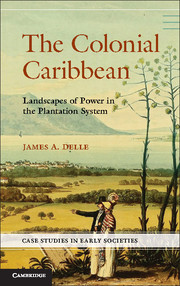Book contents
- Frontmatter
- Contents
- Figures
- Tables
- Preface
- 1 Landscapes of Power in the Colonial Caribbean
- 2 His Majesty’s Island
- 3 The Plantation Mode of Production
- 4 A Class for Itself: Regional Landscapes of the Planter Class
- 5 Contradictions and Dialectics: Village Landscapes of the Enslaved
- 6 Dialectics and Social Change: Plantation Landscapes after Slavery
- 7 Plantation Landscapes in Comparative Perspective
- 8 Conclusion
- References
- Index
6 - Dialectics and Social Change: Plantation Landscapes after Slavery
Published online by Cambridge University Press: 05 June 2014
- Frontmatter
- Contents
- Figures
- Tables
- Preface
- 1 Landscapes of Power in the Colonial Caribbean
- 2 His Majesty’s Island
- 3 The Plantation Mode of Production
- 4 A Class for Itself: Regional Landscapes of the Planter Class
- 5 Contradictions and Dialectics: Village Landscapes of the Enslaved
- 6 Dialectics and Social Change: Plantation Landscapes after Slavery
- 7 Plantation Landscapes in Comparative Perspective
- 8 Conclusion
- References
- Index
Summary
Archaeologists have long been fascinated by what is generally referred to as the collapse of complex society. There is archaeological evidence scattered around the world – from the deserts of Mesopotamia to the jungles of Mesoamerica – of highly ordered, stratified civilizations whose societies fell apart and whose cities were abandoned and have since fallen into ruin. Much of the imaginative portrayal of archaeologists in the popular media depicts dashing heroes and heroines prying through the forgotten tombs and abandoned cities of such “lost” civilizations, seeking to discover the mysteries of why and how such grandeur could have fallen so thoroughly into ruin, and indeed, many real archaeologists seek to answer these very same questions.
Marxist archaeologists are rarely puzzled by the presumed collapse of complex societies. When one travels to Central America or the Indus Valley and sees the ruins of long abandoned cities, one will meet with the descendants of the people who built and lived in those ancient places. To Marxist archaeologists, the concept of “collapse” is in fact misleading; societies change over the course of their history, change that sometimes leads to a restructuring of the social order defining how people relate to each other, how they make their living, and how they design and live within their social and physical landscapes. In short, modes of production sometimes change as a result of dialectical conflict, and that change can result in the abandonment or redefinition of those elements of the forces of production no longer required for the newly emerged social relations of production to work and be reproduced. This phenomenon is clearly visible in the many abandoned landscapes dotting our world, not only in ancient contexts like the abandoned cities of Tikal and Harrappa, but in the more recently abandoned industrial landscapes of Britain, New England, and the American Midwest, and in the abandoned and redefined plantation landscapes of Jamaica.
- Type
- Chapter
- Information
- The Colonial CaribbeanLandscapes of Power in Jamaica's Plantation System, pp. 177 - 197Publisher: Cambridge University PressPrint publication year: 2014

